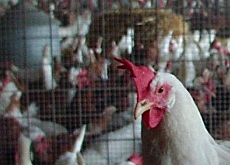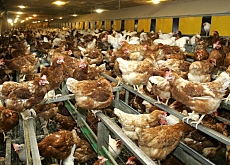Free-range poultry hit hardest by ban

The cabinet's decision to confine poultry to their cages as of Monday to counter the spread of bird flu could damage Switzerland's growing free-range industry.
swissinfo took stock of the situation and visited a farm near the Swiss capital Bern where 2,000 free-range laying hens are about to be placed under indefinite house arrest.
Poultry farmer Peter Reinhard has increased his flocks tenfold since he gave up raising pigs to focus on free-range egg production in 1990.
The growth of his business mirrors that of the increasing popularity of free-range poultry products certified by the organic food organisation, Bio Suisse.
In 2004, Swiss consumers bought 52 million eggs from free-range and organically fed chickens – five times more than they did in 1997.
According to Kagfreiland, a farm animal protection organisation which issues its own organic food label in conjunction with Bio Suisse, around half of the estimated two million laying hens in Switzerland are free range.
“It won’t make any sense for consumers to buy eggs from free-range hens when they know the hens weren’t allowed outside,” says Reinhard. “The situation is ridiculous.”
Flock size
Like all poultry farmers with the Kagfreiland seal of approval, Reinhard is bound to numerous restrictions, including limiting the size of his flocks to a maximum of 500 (compared with 12,000 on conventional farms) and only using organic feed.
He also must let his chickens graze outside every day of the year in a fenced-in pasture where there are shelters for refuge and bushes which provide shade in summer.
But house arrest means Reinhard has had to set up several distractions in the hen house to make conditions more bearable.
“You can see how popular the roosting perches are with the hens,” he says. “We have to keep them occupied, and that’s why I’ve put in pine branches and overturned buckets for them to peck at and hung up string for them to pull on.”
Still, he expects his chickens to become more aggressive cooped up inside. For the farmer, it means additional work, keeping an eye on his flocks and cleaning out the stables, as well as higher maintenance and feed costs.
Better quality
Reinhard thinks consumers will also suffer.
“The quality of the meat is more tender because it comes from healthy chickens that were able to move about freely, and the yoke of eggs from free-range hens is a natural yellow, not orangey, which it sometimes is if it has been artificially coloured,” he explains.
The Federal Health Office ruled on Friday that Bio Suisse and Kagfreiland could continue putting their labels on products from certified farms, even though the free-range conditions will no longer be met.
Roland Weibel from Kagfreiland told swissinfo that the previous confinement that ran for a few months at the end of last year did not adversely affect poultry sales.
However, he said it was difficult to predict how consumers would react this time since this confinement is unlimited in duration and the public has yet to be confronted with news that bird flu has reached Switzerland.
Instead of a nationwide ban on allowing poultry outdoors, Kagfreiland has called for “long-term strategies”.
Weibel said bans could be restricted to areas considered at high risk, such as near lakes where migratory birds gather.
He added that farmers could be better educated about the H5N1 virus symptoms in order to be able to alert the authorities as soon as possible to prevent the disease from spreading.
Efforts could also be stepped up to develop vaccines and to conduct tests to see if there are any poultry breeds resistant to the virus, therefore exempting them from any bans.
swissinfo, Dale Bechtel in Wengi
The farm animal rights organisation, Kagfreiland, estimates that about 1.5 million of a total of seven million chickens in Switzerland are granted some form of “free range” and are therefore directly affected by the ban.
Around a third of the more than 6,000 farms (11% of all Swiss farms) certified by the organic food organisation, Bio Suisse, sell eggs from free-range and organically fed hens.
As of February 20, poultry farmers will have to keep their animals indoors for an indefinite period as a preventive measure to keep bird flu from affecting Swiss livestock.

In compliance with the JTI standards
More: SWI swissinfo.ch certified by the Journalism Trust Initiative


You can find an overview of ongoing debates with our journalists here. Please join us!
If you want to start a conversation about a topic raised in this article or want to report factual errors, email us at english@swissinfo.ch.